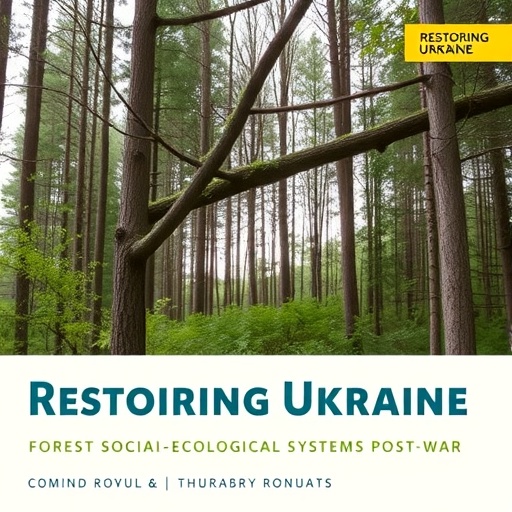In the wake of conflict, the intricate relationship between human societies and the environment becomes a focal point in any recovery effort. A recent article by researchers Melnykovych, Nijnik, Soshenskyi, and colleagues delves into the essential pathways for nature recovery in post-war Ukraine, particularly emphasizing forest socio-ecological systems. This exploration underscores not only the immediate need for ecological rehabilitation but also the long-term benefits of sustainable practices in forest management.
The importance of forests in Ukraine cannot be overstated. Historically, forests have provided myriad benefits to local communities, including resources like timber, food, and recreation opportunities. However, war disrupts these ecosystems, leading to deforestation, biodiversity loss, and social fragmentation. The researchers explore how addressing ecological recovery is not merely an environmental concern but a crucial step towards restoring societal resilience.
A central theme of the article is the notion of socio-ecological systems, which integrates human and natural systems as interconnected entities. In the context of Ukraine, where war has wreaked havoc on both people and nature, understanding the link between human well-being and forest health becomes vital. The researchers argue for a holistic approach that considers environmental, social, and economic dimensions in post-war recovery plans, advocating for community engagement as an essential component of this effort.
The team proposes several strategies to revitalize Ukraine’s forest ecosystems post-conflict, focusing on restoring biodiversity and improving forest management practices. These strategies include the reintroduction of native species, regeneration of damaged forest areas, and the establishment of protected areas to safeguard vulnerable ecosystems. By employing adaptive management techniques that promote resilience, Ukrainian forests could not only recover but thrive, presenting opportunities for carbon sequestration and climate change mitigation.
Moreover, the article illustrates the role of local communities in spearheading recovery efforts. Engaging citizens in the restoration process fosters a sense of ownership and responsibility towards their natural surroundings. The researchers highlight successful case studies where local initiatives have led to significant improvements in forest cover and biodiversity. This local involvement is seen as a critical factor for sustainable recovery and long-term ecological stability.
The authors place significant emphasis on the integration of traditional ecological knowledge with modern scientific understanding. In many communities, indigenous practices offer valuable insights into sustainable forest management. By bridging these two knowledge systems, adaptive strategies can be developed that harness the strengths of both local wisdom and contemporary ecological science, enhancing the effectiveness of recovery efforts.
Financial investments will undoubtedly play a crucial role in this recovery. The researchers advocate for the mobilization of both public and private funds to support reforestation projects and sustainable land management practices. This financial backing, coupled with transparent governance and equitable policy frameworks, can create an enabling environment for successful implementation of restoration initiatives.
Additionally, the role of education and capacity-building cannot be overlooked. The authors propose that educational programs on the importance of forest ecosystems and sustainable practices should be integral to recovery efforts. By empowering future generations, a culture of environmental stewardship can be cultivated, ensuring a lasting impact on Ukraine’s ecological future.
The authors acknowledge the challenges posed by a war-torn economy, where resources are limited and public trust may be fractured. Nevertheless, they argue that the urgency of forest recovery can act as a unifying force, drawing people together and fostering collaboration across diverse sectors of society. The concept of “building back better” is pivotal, encouraging a transition towards sustainable practices that can serve as a buffer against future adversities.
As Ukraine embarks on this complex journey of recovery, the researchers call for a collective commitment from all stakeholders, including government agencies, non-profit organizations, and the international community. Collaborative frameworks are essential to not just restore ecological balance but also rebuild social cohesion, thus laying the groundwork for a more resilient future.
The implications of successful forest recovery extend far beyond ecological health; they encompass economic revitalization and enhanced quality of life for local communities. By prioritizing environmental sustainability, Ukraine can position itself as a leader in ecological restoration and climate change mitigation, setting a powerful example for other post-conflict regions around the world.
Ultimately, the pathways for recovery in Ukraine are fraught with challenges but also replete with opportunities. By fostering a profound respect for nature and understanding the critical interconnections between human and ecological systems, post-war Ukraine stands at the cusp of a transformative journey. The future of its forests and the wellbeing of its people depend on the choices made today—choices that align with sustainable development and restorative practices.
In conclusion, the insights provided by Melnykovych and colleagues serve as a clarion call to action for policymakers, environmentalists, and local communities alike. As the nation begins to heal from the scars of conflict, the conscious prioritization of forest recovery could make all the difference, shaping not just the landscape, but the very fabric of Ukrainian society.
Subject of Research: Pathways for Ukraine’s post-war nature recovery with a focus on forest socio-ecological systems.
Article Title: Pathways for Ukraine’s post-war nature recovery: Focus on forest socio-ecological systems.
Article References: Melnykovych, M., Nijnik, M., Soshenskyi, O. et al. Pathways for Ukraine’s post-war nature recovery: Focus on forest socio-ecological systems. Ambio (2025). https://doi.org/10.1007/s13280-025-02263-0
Image Credits: AI Generated
DOI: 23 October 2025
Keywords: Forest recovery, socio-ecological systems, Ukraine, ecological restoration, post-war recovery, sustainable practices.




